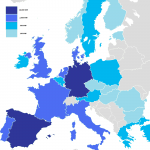Law stating that Germany must outlaw nuclear power generation by 2022 is encouraging more talk of an EU-wide electricity system.
After the Fukushima disaster in Japan, Germany decided to shut down its 17 nuclear power stations by 2022, closing the 7 oldest ones immediately.
This has turned Germany from a net exporter of electricity, to a net importer of electricity almost overnight. Germany has over 21,000 wind turbines – more than any other country in Europe.
Germany now imports power from France which is generated by nuclear power, where EDF Energy’s running of its 58 nuclear reactors is still a mainly privatised affair. Nuclear power supplies around 75% of France’s electricity.
This heightened need to transport electricity around Europe to meet fluctuating demand is leading to increased talk of the proposed ‘European super-grid’, which is being priced at around £28 billion.
The ‘super grid’ would help to balance load at times of higher or lower demand in all European countries. This changes at different times of the day and year, and is going to become ever more dependant on variations in wind strengths too. It would also likely mean an EU-wide electricity trading market, allowing the utilities giants like the “big six” to sell energy to any country in the EU.

